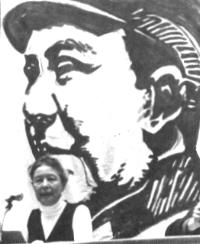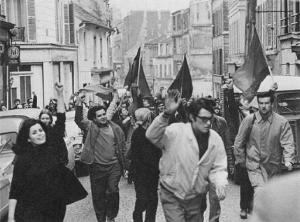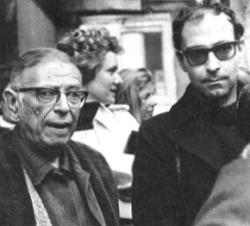
by Desdemone Bardin
France 1969 — 1973

Heirs to the Maoist Union de la Jeunesse Communiste M-L, la Gauche Prolétarienne (GP — Proletarian Left), was founded in 1969. Though it existed for only four years it, and its former members, had a far-reaching effect on French political life.
Its ideology was heavily ouvrieriste, and it is perhaps best known for its heavy reliance on the principle of établissement, the implanting of its (mainly intellectual) members in factories (a brilliant account of which can be found in a book by a member of the GP, Robert Linhart, L'Établi). In doing so, the GP threw itself headlong into some of the toughest and tensest areas: the Renault factory at Billancourt, the shipyards in Dunkirk, the mines of the north...
Its slogans in the workplace were direct and simple: slowdowns, sabotage, and direct action against bosses and supervisors in the form of sequestrations; they even went so far as to call for the lynching of Deputies. They hated the existing unions (particularly the Communist-led CGT) and, as one of their internal bulletins said: “Demands, unions and lists of demands smell of the reformist litany.” The title of one of their tracts says it all: “Towards a civil war.”
They considered France an occupied country, called themselves new partisans and advocated a “new popular resistance.” The logic of this point of view resulted, almost inexorably, in the death of one of its militants, Pierre Overney, at the hands of Renault security forces. This death led to public outrage and a huge outpouring of sympathy at “Pierrot’s” funeral, but it also shocked the membership. Within a year the group had decided to dissolve, destroyed by signs of workers increasingly taking control of their struggles without the party’s assistance, its own sectarianism, and the all-encompassing — almost totalitarian nature — of life in the GP.

Its greatest moment of celebrity came in 1970, when the government attempted to close down their newspaper, La Cause du Peuple. Its editors were arrested and the paper seized, until Jean-Paul Sartre came to the rescue. The leadership of the GP asked if he would assume direction of the “rag,” and he accepted. In accepting this post Sartre all but dared the government to arrest a Nobel Laureate. But he didn’t stop there. Along with other intellectuals, like Jean-Luc Godard and Simone de Beauvoir, he also sold the paper on the street. And during the trial of party leader Alain Geismar he refused to testify in court, but instead went to the Renault factory at Billancourt, stood on a barrel, and addressed the workers directly.
 |
| Simone de Beauvoir, photo by Desdemone Bardin |
The dissolution of the GP, decided by the party in the Fall of 1973, was not the end of the political life of its leaders, though. Alain Geismar is now an advisor to the mayor of Paris. Serge July is the editor of the daily Libération, which has evolved from its ultra-left roots into one of the most prestigious papers in France. Christain Jambet and Michel Le Bris became noted philosophers. And then there’s Pierre Victor...
Intellectual leader of the GP, he later became Sartre’s personal secretary. Once the co-author, with Sartre, of On a Raison de se Révolter [It is Right to Rebel], he later re-assumed his real name, Benny Lévy, and followed a path leading to Orthodox Judaism, via the intermediary of the philosopher Emmanuel Lévinas. He studied at a yeshiva in Strasbourg, moved to Jerusalem, and took up the wearing of a yarmulke and strict adherence to Jewish law. At the time of his death in October 2003 he was the director of the Institut des Études Lévinasiennes.
Articles
A New Form of Organization..., Cause du peuple, 1969
The J.C.R. in May-June 1968, Cahiers de la Gauche Prolétarienne 1969
The Line of Demarcation in Union Matters, Internal Bulletin 1969
Blow for Blow, Cause du peuple, 1970
I Will Testify in the Streets, Cause du peuple, 1970
New Partisans, Gauche Prolétarienne song